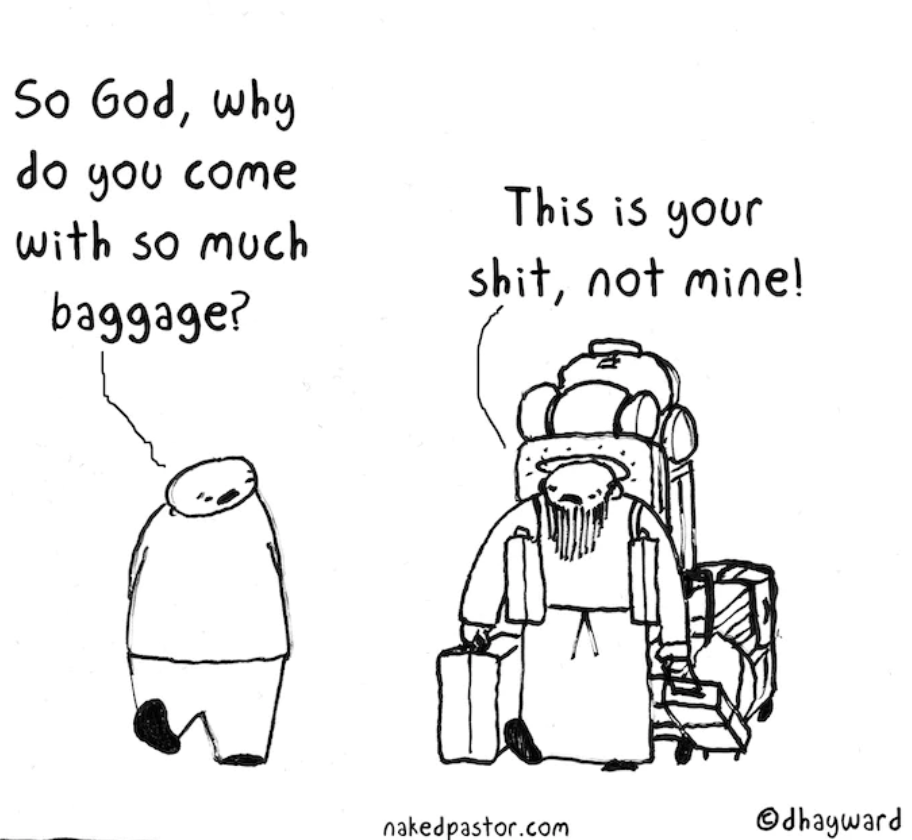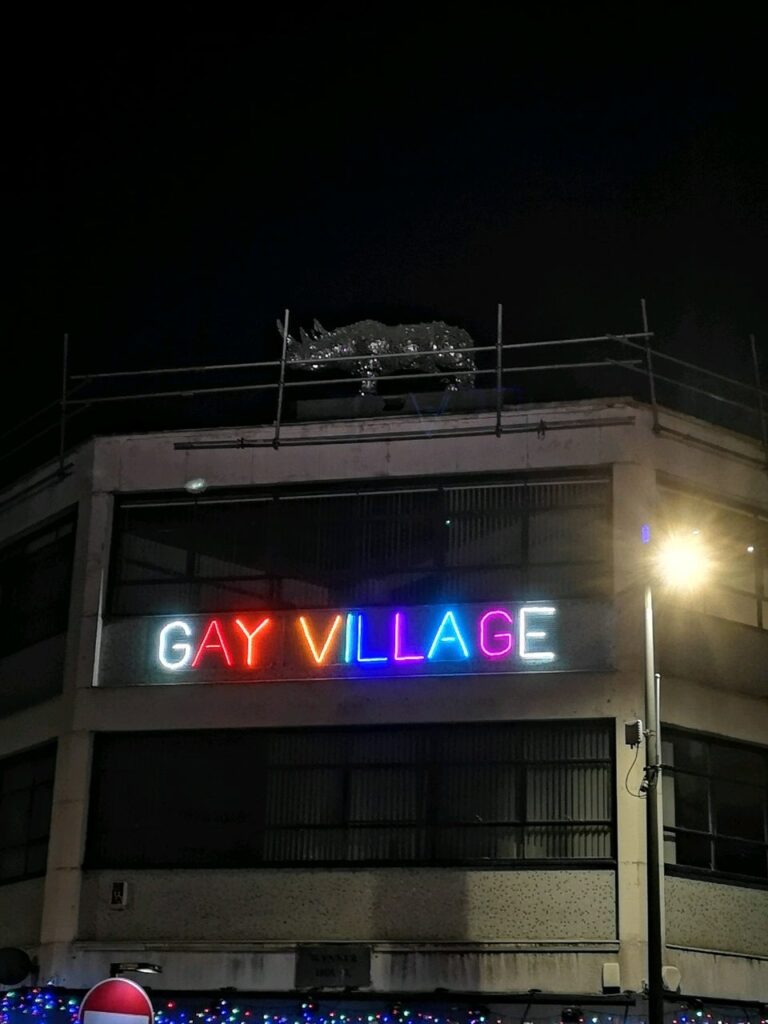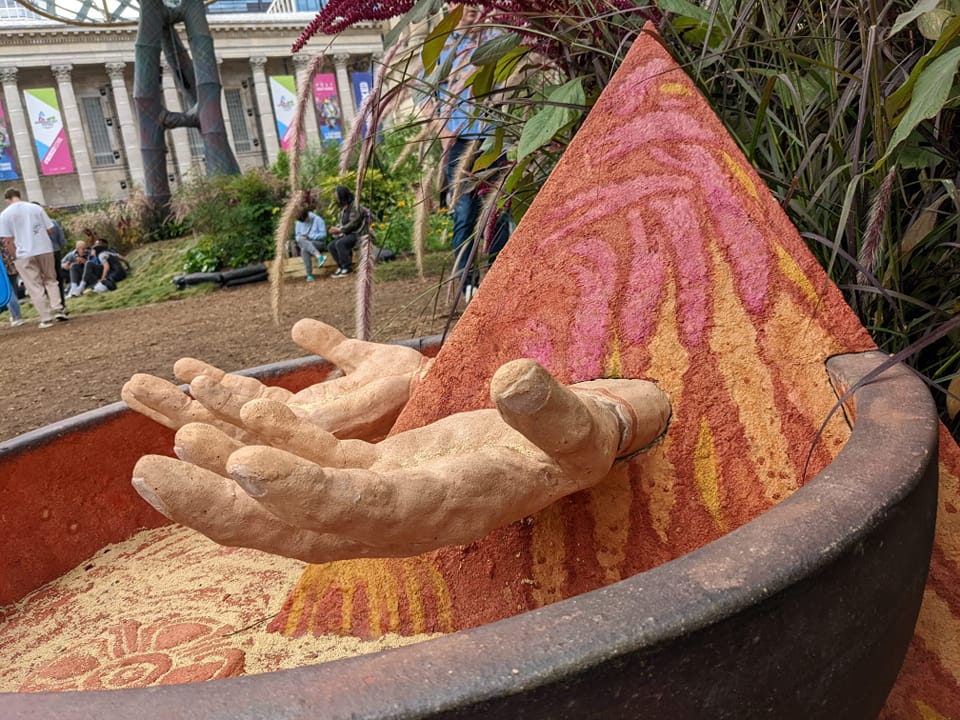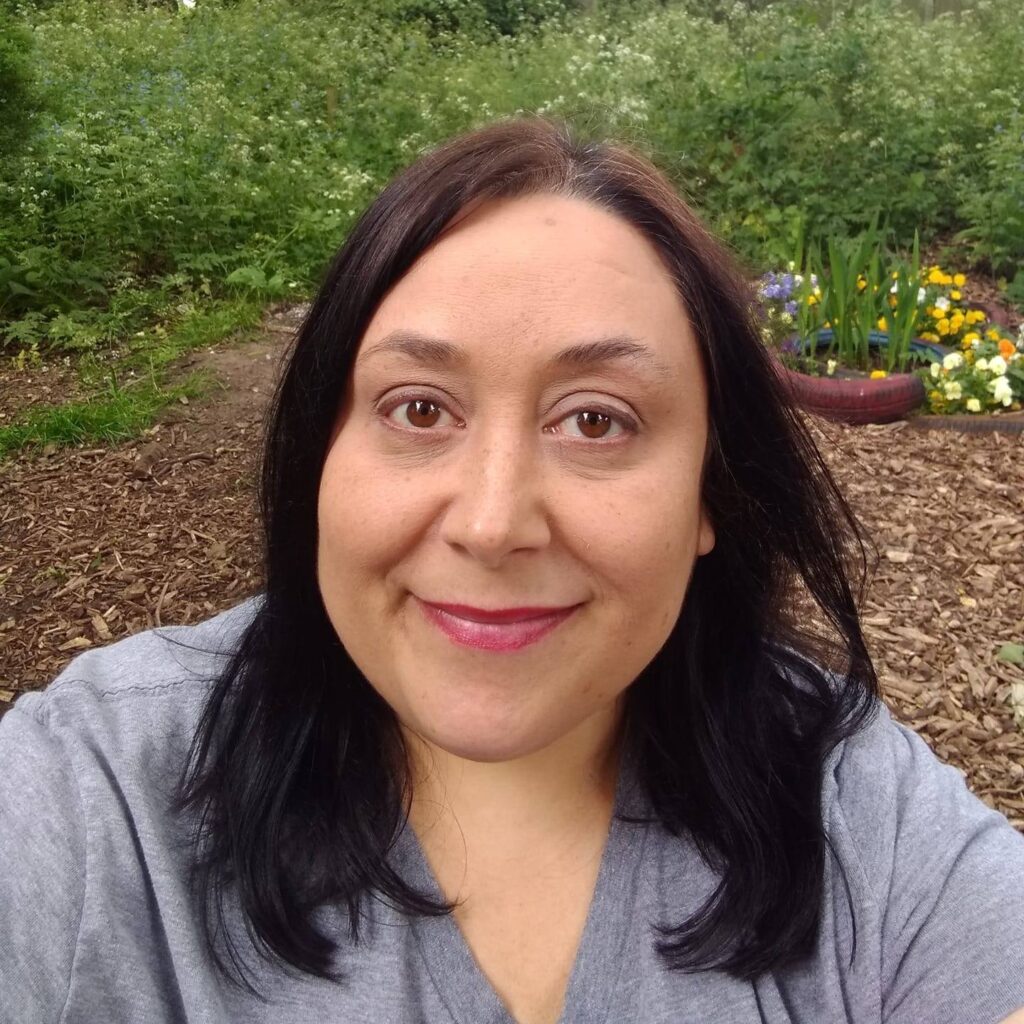This blogpost is based on a talk shared by Danielle Wilson (she/her), the pastor of Inclusive Gathering Birmingham this past Sunday. You can watch the talk in full here, or read it below – whatever works for you!
We’re starting today with this story about Jesus from the Gospel of Mark 5:25-34:
25 A woman in the crowd had suffered for twelve years with constant bleeding. 26 She had suffered a great deal from many doctors, and over the years she had spent everything she had to pay them, but she had gotten no better. In fact, she had gotten worse. 27 She had heard about Jesus, so she came up behind him through the crowd and touched his robe. 28 For she thought to herself, “If I can just touch his robe, I will be healed.” 29 Immediately the bleeding stopped, and she could feel in her body that she had been healed of her terrible condition.
30 Jesus realized at once that healing power had gone out from him, so he turned around in the crowd and asked, “Who touched my robe?”
31 His disciples said to him, “Look at this crowd pressing around you. How can you ask, ‘Who touched me?’”
32 But he kept on looking around to see who had done it. 33 Then the frightened woman, trembling at the realization of what had happened to her, came and fell to her knees in front of him and told him what she had done. 34 And he said to her, “Daughter, your faith has made you well. Go in peace. Your suffering is over.”
Jesus at the Gay Bar (by Jay Hulme)
He’s here in the midst of it –
right at the centre of the dance floor,
robes hitched up to His knees
to make it easy to spin.
At some point in the evening
a boy will touch the hem of His robe
and beg to be healed, beg to be
anything other than this’
And He will reach His arm out,
sweat-damp, weary from dance.
He’ll cup this boy’s face in His hand
and say,
my beautiful child
there is nothing in this heart of yours
that ever needs to be healed.
-Jay Hulme

Imagine Jesus on the dance floor in a gay bar, as this poem describes. Dripping with sweat, laughing, cheeks flushed, clothes hiked up to knees. It’s actually difficult to find pictures of Jesus dancing, so I had to make my own. Unfortunately, I could only find a sketch of white Jesus dancing, and I had to put him on the dancefloor myself! But you get the idea.
Now, it’s tempting for us to think of Jay Hulme’s poem as subverting the original story of Mark 5. But the truth is, it is very much is in keeping with the original. It’s in keeping with how Jesus lived and moved in the world.
For many of us, stories like these have baggage because of the ways they have been framed for us in faith contexts. It goes something like … Jesus goes to bring light into a dark place (aka where you are) … Jesus goes into worldy, unholy environments to heal the broken and pull them out of where they are (because it is bad there)…
If these are the only ways you have heard these stories framed and YOU identify as the outsider, they can make you feel othered … a bit less than…

This cartoon by the wonderful Naked Pastor says it well:
“So God, why do you come with so much baggage,” the man asks.
God replies, “This is your shit, not mine.”
God could just as easily have replied, “This is the church’s shit, not mine.”
Today, I want to challenge the primary way we have been led to see Jesus in this story, and in so many other stories like it.
Let’s go back to Mark 5. Of course there IS physical healing involved in the story of the woman who reaches out for Jesus in faith. She is healed of great physical, debilitating pain, but she is also healed of the pain of rejection.
According to Levitical law the woman, continually bleeding for 12 years, would have been seen as unclean – and so deliberately excluded from her community. To touch or to allow yourself to be touched by an unclean person was unthinkable. Imagine that pain of being untouchable. Or maybe, sadly, you don’t have to imagine.
I love the poignant way that the poet Jay Hulme bring out this theme in Jesus at the Gay Bar (from his poetry collection The Backwater Sermons). In a blogpost about his poem he writes:
“Jesus states ‘there is nothing in this heart of yours that ever needs to be healed’
Or… is that not quite true?
You see, there is healing in this poem – it’s just not the healing you’d expect.
In the poem, just as in Mark 5, and throughout the Gospels, Jesus does the unexpected …
The boy’s queerness is not healed, because, as stated, it does not need to be healed. And it is through not healing their queerness that the boy (and hopefully the reader) is healed of whatever it was that made them reach out to Jesus in the first place, and beg to not be queer.“
How beautiful and profound.
Mexican American liberation theologian Virgilo Elizondo uses a term he calls the Galilee Principle in his book the Galilean Journey: The Mexican-American Promise. He describes this principle simply:
“What human beings reject, God chooses as his very own.”
Read that line again.
“What human beings reject, God chooses as his very own.”
Theologian and justice advocate Daniel Groody helpfully summarised Elizondo this way:
“The fact that Jesus is born in a stable in Bethlehem and takes up his residence and ministry in Galilee is more than a geographical note recorded by the evangelists.
Rather, it is the beginning of the good news, especially for those who are poor and excluded in any way.
Jesus’ entry into the world challenges the way the world normally thinks about power, authority, and greatness…
From this social location he undermines all the world’s categories, which deprecate and dehumanise … classify or segregate human beings based on social labels such as superior or inferior, rich or poor, worthy or unworthy.…”
Proximity matters. Location matters. Where we situate ourselves matters. It is part of the Gospel.
Jesus didn’t deign to spend time with people that disgusted him. He didn’t go somewhere that he was out of place. He WAS one of them. He was BORN one of them.
Jesus was always found amongst people and places that made religious leaders and those who had power super uncomfortable.
He was always found with those who have been marginalised and excluded – eating with them, going into their homes, touching people that were ‘untouchable’, making them friends and inviting them into his inner circle.
I tend to think that Jesus not only placed himself in these places for the benefit of those who are excluded. His very way of being was a challenge and an invitation to those with power: Lay your power down. Live a different way. Learn from the margins.
Because of who we are as individuals and as a community at Inclusive Gathering Birmingham, this kind of association with the Jesus of the Margins has been a gift to so many of us (in a variety of ways). It’s our bedrock at IGB. We know that if we have been hurt, demeaned or excluded because we are gay, trans, because of disability, race, social class, mental health, education, finances, neurodiversity or awkward personalities… We stand with Jesus. Always with Jesus.
This leads me to our story and (finally) to our big news.
Earlier in the summer I was invited to be part of a partnership conversation with folks from the local council, public health and various LGBTQIA+ organisations and charities. The meeting was to talk about how we can be part of the flourishing of the LGBTQIA+ community in Birmingham. I am still not exactly sure how I was invited to be part of this esteemed group, but I was the only faith leader present.
During the meeting, a leader from Birmingham Pride commented how glad they were that a faith leader was present as it is important to talk about spirituality in the LGBTQIA+ community. Oooh, I thought.
A few minutes later, a leader from Southside said something that blew me away. I’m paraphrasing: “As an ally, I want the Gay Village to glow so brightly with rainbows that it can be seen from space. I want everyone who walks into the village to know that they are safe, welcome and cared for.”

Wow. Those words got me thinking. As Inclusive Gathering Birmingham, where should WE be? As a gathered church community we have folks coming from all over the Midlands to find a faith space that is inclusive and affirming where they can worship as they choose and be themselves. In that way we are NOT a local church. So for obvious reasons it’s been tough for us to feel rooted in a particular place within the city. We have been gathering in a central place, but we haven’t really BEEN part of a wider community. And if you aren’t PART of a community, it’s hard to serve a community.
As I prayed about this I started to wonder, what if the Gay Village became our place to be rooted? What if we committed ourselves to being present there, to meeting there, to being responsive whatever the spirit lead us to do to seek the flourishing of the community? What if we helped with those glowing rainbows of safety and welcome?
I googled. I couldn’t find any churches or Christian groups in or around the village that were part of the Inclusive Church Network and/ or who offered a no-holds-barred welcome to LGBTQIA+ folks. (When we say welcome, we mean don’t just mean ‘allowed in the door’ we mean clearly invited and fully enabled to participate, lead and serve on level footing with others without restrictions or shame.)
I started having lots of conversations with community leaders, with the LGBT Centre, with a few Pride Organisers, with our own IGB leadership and with a wide variety of attendees and friends. Everyone I spoke to got excited about the idea of Inclusive Gathering being rooted in the Gay Village, but we had no idea how it would practically happen. We prayed and talked some more.
Throughout the summer I had a picture in my mind of us standing there (collectively) with hands open and fingers spread, as tiny pieces (perhaps chunks of glitter?) floated softly and slowly through the air. There was a sense that we didn’t need to struggle or move around to catch the pieces; the pieces we needed would land in our hands, and the stuff we didn’t would fall through our fingers.

After a particularly encouraging chat with a leader in Southside, I emailed The Loft – a brilliant bar and restaurant with meeting rooms in the heart of the Gay Village – to see if we could perhaps use one of their rooms to host a few conversations about our next steps . The Loft then offered to let us use their space every Sunday afternoon, which was far more than I was asking for in that moment or expecting. Such generosity. Thanks Loft!
Thankfully, we are the kind of church that has very little red tape, and so we are able to grasp opportunities like this when they come up. And so from Sunday, 11th September, we’ll be meeting every Sunday at the Loft at 3pm.

For this season, we’ll aim to have a larger ‘worship gathering’ upstairs at the Loft on the 1st Sunday of the month. All of our other Sundays, our times together will be be worshipful but more lowkey, oriented around spiritual connection and conversation. God knows we love to chat!
My friend Sally Mann often uses the term ‘wet cement’ to describe these kinds of stages of growth. We know the direction we are headed and we have some things to try, but the cement is wet. That means it’s pliable and YOU can put your mark on it. We’re still slowly taking shape, and we need the input of the whole community to form the next steps.
If this vision gives you hope or excitement, we’d love you to be part of the ongoing conversation, starting with the 11th September at the Loft at 3pm!
We, of course, need to express our thankfulness for the use of the Edgbaston Quaker Meeting House at Five Ways over the last year that has in lots of ways been an oasis for us – a place of peace. But it’s time for us to carry that peace out with us again..
It’s important to say, I think, that just because we are locating ourselves in the Gay Village, this does not mean that our church is only for LGBTQIA+ people. Far from it. Our church is made up a majority of LGBTQIA+ folks (in congregation and leadership), but I personally am straight and cisgender.
I LOVE being part of this church community because I am absolutely not content to worship in a church where anyone is excluded. And most importantly, because my faith, my walk with Jesus, has been infinitely blessed by my experience of queer spirituality and theology and by the lives, grace and faith of many, many LGBTQIA+ people. I want more people to experience this. It’s beautiful.
Our friend NYC Queer Priest Reverend Liz Edman, author of Queer Virtue: What LGBTQ People Know about Life & Love and how it can Revitalise Christianity, writes about this so brilliantly. (Read her book, please.) She asks this important question:
“If my queer identity informs my understanding of my Christian faith, might the lessons of queer identity help other Christians better understand their faith, too?”
YES!
We are intentionally situating ourselves in a place that many Christians would say church should NOT be (at least not in a posture of learning, integration, friendship and equity with the rest of the community). But with what I know about Jesus, I would say, the Gay Village is exactly where Jesus would want to be. And I think it’s where he’d want to go to church, too. So let’s be like Jesus, dancing in gay bars with our skirts hiked up, dripping with sweat, cheeks flushed with joy and with love for the beautiful people around us.

Danielle Wilson (she/her) is Inclusive Gathering Birmingham‘s pioneer leader/pastor and loves to help create safe spaces to discuss life’s deepest questions …particularly over food. She believes that loving Jesus pushes us to pursue social justice and inclusion in our communities. Danielle has more than 25 years experience in mission leadership and communications and was part of the team that launched and led Red Letter Christians in the UK 2019-2022. She has an MA in Contemporary Missiology: Reconciliation, Justice and Advocacy. She’s also been a singer for many years with the all-female acoustic soul band Eeek (who play at our special events from time to time). She’s married to Joel and mum to Evie and Josie.









